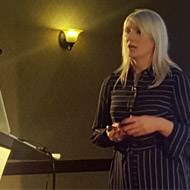Learn to control your inner chimp

Leonie Lightfoot explained the principles of 'the Chimp Paradox'.
Do you tell yourself you'll go to the gym everyday but never manage it? Or that you'll only eat one square of chocolate, before finishing off the whole bar? We often blame ourselves for these everyday failures, but apparently the true culprit could be our inner chimp…
Leonie Lightfoot, who works closely with the psychiatrist and author Dr Steve Peters, explained the principles of the groundbreaking mind model, 'the Chimp Paradox', to delegates at this year's SPVS/VMG Congress.
While we may promise ourselves to get an early night, go on a diet, be nicer, give up Facebook, we often fail to keep these promises and berate ourselves accordingly. So why do we find it so hard to change?
Leonie says it is important to understand that there are always two of you trying to interpret the world - you, and your chimp. The brain has its own agenda; to keep you safe and to pass on your genes. But we as humans have another agenda, which is finding purpose and fulfilment in life.
The brain can be divided into three parts - the logical human part; the emotional chimp; and the 'computer' or reference library, which allows you to carry out tasks you've already learnt and can do without thinking. The human part is evidence based and rational, allowing for balance and perspective, while the chimp is irrational, paranoid, jumps to opinions, assumes the worst case scenario and thinks in black and white.
Your chimp is five times stronger than your human, Leonie said, as it always gets the 'first look' at a new situation, to keep you safe from danger. The chimp will look into the 'computer' to see if you have faced something similar before, and if it decides this new situation is a threat (physical or otherwise), the brain will release neurotransmitters putting you into a state of 'fight or flight' and the logical 'human' part shuts down.
If, however, the computer contains helpful information, the chimp will shut down and the human takes over. The human aspect of the brain can also 'load' new information into the computer, which is why Leonie says reflection at the end of each day is important.
A key way to recognise your chimp, she says, is to ask yourself; "Do I want this thought, feeling or behaviour?" If no, it is likely you have been hijacked by your chimp.
Our inner chimp is neither good nor bad; it just 'is'. In some respects it can be helpful, giving you ambition, excitement, your gut instinct, ability to read body language and protect yourself from danger. It has the potential to be your worst nightmare or your best friend and you are responsible for it. While you can never get rid of it, you can learn to understand it and acquire the skills to manage it.



 The veterinary mental health charity Vetlife is inviting the veterinary community to join it for a sponsored cold-water dip.
The veterinary mental health charity Vetlife is inviting the veterinary community to join it for a sponsored cold-water dip.